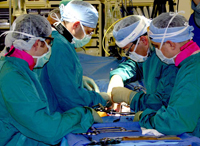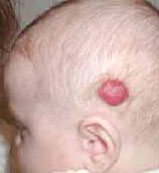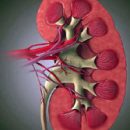Modern oncology does not lose hope to overcome cancer and for the treatment of kidney cancer offers all possible methods and methods. What funds are in the arsenal of modern medicine and from which the diagrams of the treatment of kidney cancer depend on this article - you can learn from this article.
Content
 There is no doubt that the surgical approach to this day remains the only effective in the treatment of kidney cancer. Operational intervention is applied in almost all cases when only it is possible. The main operational method is radical nephrectomy. With radical nephrectomy, surgeons remove the kidney along with the adrenal gland, which is located on top of the kidney, the boundary of normal tissue and adjacent lymph nodes. Although the effectiveness of the removal of lymph nodes is so far and has not been proven. The best evidence of the success of the operation is the absence of cancer recurrence after some time.
There is no doubt that the surgical approach to this day remains the only effective in the treatment of kidney cancer. Operational intervention is applied in almost all cases when only it is possible. The main operational method is radical nephrectomy. With radical nephrectomy, surgeons remove the kidney along with the adrenal gland, which is located on top of the kidney, the boundary of normal tissue and adjacent lymph nodes. Although the effectiveness of the removal of lymph nodes is so far and has not been proven. The best evidence of the success of the operation is the absence of cancer recurrence after some time.
Radical nephropectomy can be performed in two ways - open (traditional and most frequently used method) and laparoscopic. Laparoscopic nephrectomy can benefit from traditional open surgery, because it usually leads to a smaller number of subsequent pain, faster recovery and it is less terrifying. With a laparoscopic procedure, a tiny camera is inserted into the body through a small incision. The camera transmits video images that allow the surgeon to see the kidney close-up. Surgeon inserts tools through two or three additional small cuts and performs operation.
But there are cases when nephrectomy is inappropriate or simply can not, then the organ-powder operation is performed - the kidney resection (cutting of the kidney tumor). This operation is a generally accepted method of treating patients with a single kidney tumor, bilateral lesions (cancer of both kidneys), as well as when the signs of renal failure are detected. Kidney resection can be done in other cases, however, the expediency of its execution with a normally functioning opposite kidney and to this day is the subject of disputes.
One group of researchers considers it inappropriate to perform the rebellion of the kidney with a normally functioning second kidney, referring to the best remote results after a radical operation (nephrectomy). Another group indicates the ability to perform kidney resection with small (up to 4 cm) tumors regardless of the opposite kidney function. Some researchers are considered to be possible to perform kidney resection only with tumors less than 2 cm, since, in their opinion, with resection of larger neoplasms, the risk of local recurrence increases significantly.
The kidney resection can also be made by the laparoscopic method, but this operation has not received widespread.
Immunotherapy
Along with the surgical treatment of the kidney tumor, it is possible to use conservative methods, the main value of which has immunotherapy. It is mainly applied in the metastatic and recurrent (repeating) kidney cancer and is aimed at strengthening the struggle of the immune system with a tumor.
The most widespread use of interleukin-2, alpha interferon or combinations thereof. These drugs are effective in 15-20% of patients, with short-term or long remission (stop disease). Moreover, the effectiveness of small doses of interleukin-2 or alpha interferon is practically no different from the effectiveness of large doses.
But immunotherapy is not always effective. And it depends on the histological structure of the kidney cancer: so, the best results are observed in patients with lightweight and mixed cancer, but for sarcomaid tumors, the effectiveness of immunotherapy with cytokines is extremely low.
In some cases, immunotherapy is prescribed as therapy after surgical treatment of cancer to prevent disease recurrences and metastasis.
In recent years, the possibilities and other cytokines in the kidney cancer in recent years are actively studied, however, alas, new highly efficient immunopups have not yet been able to create.
Chemotherapy
The role of chemotherapy is less important, because, as a rule, kidney cancer is little sensitive to antitumor drugs. However, during metastatic and recurrent tumors, the chemotherapies can still be minimally effective. Chemotherapy are usually combined with immunotherapy. The most frequently prescribed cytotoxic drugs include vinblastine (effective in 6-9% of patients) and 5-fluororation (effective in 5-8% of patients).
Hormonal therapy
Hormonal therapy, in particular, progesterone drugs, which were recently widely used to treat common kidney cancer forms, is now practically not used due to extremely low efficiency.
Radiation therapy
Radiation therapy is sometimes recommended for patients who will not transfer operation. Exposure helps reduce pain and bleeding associated with kidney cancer. However, radiation therapy of the kidney has not been widespread due to very low efficiency.
Stage I (combination T1-2, N0, m0 by TNM classification). This combination of letters and numbers denotes that the tumor does not go beyond the kidneys, the accumulative lymph nodes are not affected and there are no metastases to other organs. It is the easiest and most commonly subject to the treatment of the kidney cancer.
The main method of treatment in this situation is radical nephrectomy (open or laparoscopic). With tumors of less than 4 cm, the kidney resection is performed (as a more gentle and organ-powder operation). Postoperative radiotherapy (radiation therapy) is not usually not prescribed, since the site to which it is necessary is quite large, and side effects, such as nausea, diarrhea and a decrease in the number of blood shaped blood elements, can be quite severe.
Stage II (combination T3, N0, M0). In the second stage, the tumor is already applied to the adrenal gland and fiber within the connecting tissue, called the fascia of the gerot, but the lymph nodes are still not amazed and metastases are absent.
In this case, radical nephrectomy remains as before the main method of treatment of the tumor. But additionally perform lymphatadenectomy (the removal of regional lymph nodes into which metastasis was possible). Organship operational operations (t.E. The kidney resection) at this stage of the disease is performed only according to the indications - with double-sided lesion or a tumor of a single kidney.
Stage III (combination T3, N0, M0, or any N, T1-3, M0). The third stage is a serious test. At this stage, the tumor, as a rule, captures not only the adrenal glands and fiber, but also applies to the renal vein or lower venu, lymph nodes may not be affected or may already be the defeat of one or more nodes, but there are no metastases to other organs.
Radical nephrectomy at this stage remains the main method of treatment. But now, during operation, it is often necessary to remove the adrenal gland, tumor thrombas from the renal and lower hollow veins, resection of the wall of the lower vein hollow, extended lymphoadenectomy. The operation requires embolization of the renal arteries. Artery embolization is to stop the blood current to the kidney. This type of intervention is applied to the operation to destroy part of tumor cells and reduce bleeding during the removal of the kidney, as well as in some inoperable patients. The effectiveness of pre- and postoperative radiotherapy (irradiation) is still ineffective, so almost not prescribed. The forecast for patients at this stage of the tumor process is already adverse.
 Stage IV (combination of any T, any N, M1). With the fourth stage of kidney cancer, a tumor, as a rule, has large sizes and gives metastases to remote organs, also almost always there is a lesion of lymph nodes.
Stage IV (combination of any T, any N, M1). With the fourth stage of kidney cancer, a tumor, as a rule, has large sizes and gives metastases to remote organs, also almost always there is a lesion of lymph nodes.
Forecast for patients with widespread kidney cancer - extremely unfavorable. To facilitate the state of the patient in this case, arterial embolization of the tumor and nephrectomy is used. If the tumor does not exceed 7 cm in diameter, then such treatment can improve the survival of patients. Also nephrectomy in some cases can cause spontaneous regression (resorption) of remote metastases. Although sometimes such regression of metastases is without any intervention.
With a small number of remote metastases, nephrectomy and surgical removal of metastases are performed to increase survival. The most effective is the removal of metastases in patients with prolonged (more than 2 years) interval between primary nephrectomy and the development of remote metastases. It does not matter to remove one metastasis or several - there is no difference in survival. Doctors try to fight for the patient's life anyway. Surgical resection is carried out even in patients with metastases in the brain, but the best results are observed when removing metastases in the lungs.
In patients with metastatic cancer of the 4th stage, immunotherapy attaches great importance. Alpha interferon is widely used (about 15% of patients is effective). The best results are observed in patients who have only a single optional metastasis in the lungs. However, remission (stopping disease), and most often short-term. More promising may be the use of interleukin-2 - 5% of patients this drug causes a long-term full remission. Also used to use the combined immunotherapy of interleukin-2 and alpha interferon (according to statistics, such therapy turned out to be effective in 18% of patients, and a long-term full remission was achieved by 6% of them).
In recent years, the effectiveness of combined chemovers and immunotherapy in the treatment of patients with metastatic kidney cancer. The most commonly used interleukin-2 and alpha interferon in combination with 5-fluorochil (such therapy is effective in 19% of patients). Unfortunately, cure kidney cancer 4th degree is impossible, so all methods of treatment in this case are directed only to the extension of the life of the patient and improving its condition.









